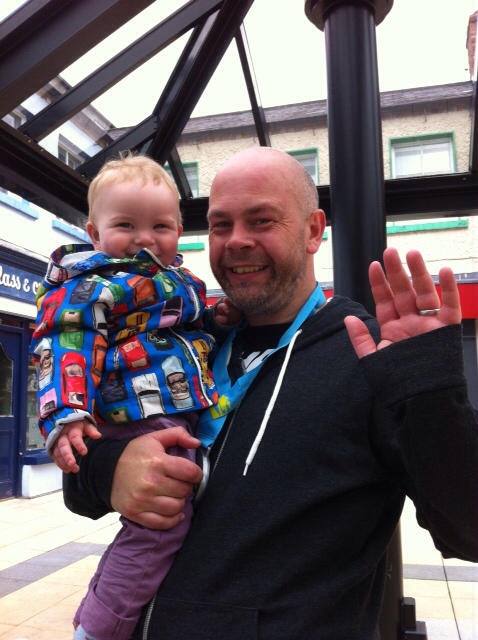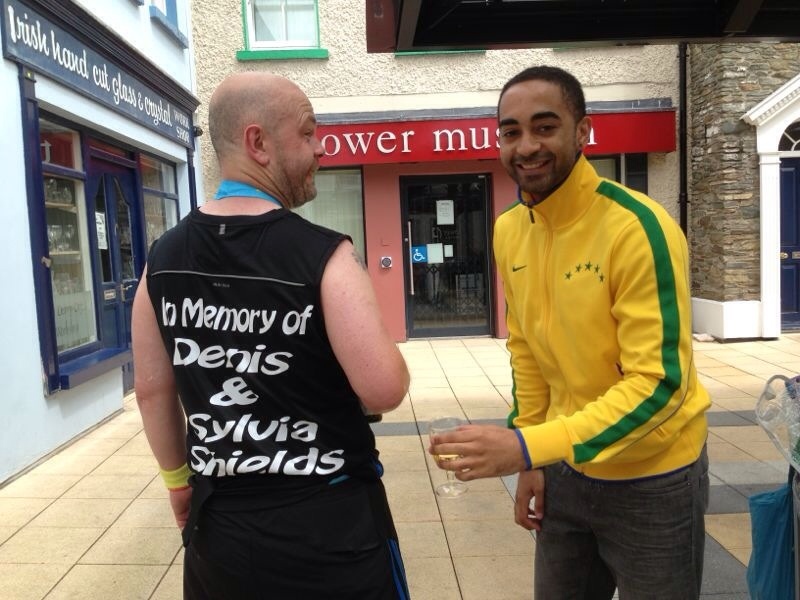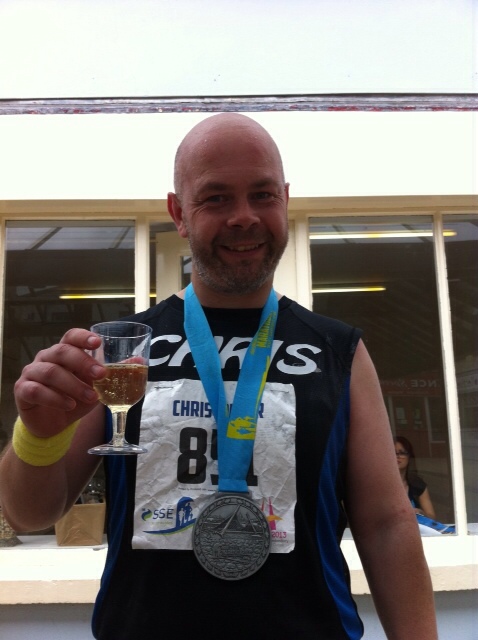Our articles are not designed to replace medical advice. If you have an injury we recommend seeing a qualified health professional. To book an appointment with Tom Goom (AKA ‘The Running Physio’) visit our clinic page. We offer both in-person assessments and online consultations.
Today we have a powerful story from psychologist and runner Chris Shields. He shares his experience of grief and bereavement and the role running played to help him…
When I first set out to write this article, it was to be an academic, intelligent, yet warm witty and insightful piece about how I had triumphed and overcome my grief following the death of both my parents over the past number of years. I was going to outline the stage model of grief and illustrate how each stage had been negotiated with the help of running and training for a marathon. However, it didn’t quite work out like that…
After a protracted and painful illness, my father passed away on 5th November 2011. While I was still in the process of trying to understand and deal with this, my mother was very unexpectedly diagnosed with cancer and died on 9th October 2012, and only two weeks after receiving her diagnosis. At this point, my life fell apart. I took time off work, lost the motivation to run or engage in any type of exercise, put on weight and struggled to be a good father to my young boys. I turned to my tried and tested coping strategy – alcohol. And lots of it. For weeks, I tried my best during the day, but once the children where in bed, I was to be found sitting on the couch, staring at the television with a beer always in my hand and tears in my eyes. Alcohol stopped me thinking too much about my loss and helped me sleep. However, it also dulled my senses and stopped from being a mindful and present husband and father. My relationship with my wife suffered, and I constantly felt guilty for my lack of enthusiasm and energy in my relationships with my children. I knew something had to change.
As a psychologist, I often discuss the role of behavioural activation and positive coping strategies with my clients. There’s lots of really interesting research which highlights the benefits of exercise on mental health and I decided to take some of my own advice. There was to be a marathon in my local city of Derry in Northern Ireland for the first time since 1985 and I decided to register. Once I had made the decision and registered I felt much more positive. I started my training program and slowly started to increase my distances. I felt like I was getting over my grief and finally putting my loss behind me. Before I knew it I was up to 10 miles on my long run and running regularly during the week. I had stopped drinking and was paying more attention to my diet. I was more alert and getting on better with my wife and children. Everything was clicking into place and I was on track for my under 4 hour finish. That was it. I had triumphed and overcome. In the face of grief and adversity I had proven my strength and determination. I was feeling so positive that, at this point, I thought it would be a good idea to write this article and share with everyone just how amazing and inspirational I was…
But grief isn’t like that is it? We don’t just go through a series of stages and then that’s it, it’s over. On a rainy Sunday evening in February, I went for a long run around the city. I was planning on running a route of approximately 10 miles, but I managed 2 miles. I just couldn’t go on that night. I stopped. For whatever reason, that night, the enormity of my loss flowed over me like a wave and I broke down. I thought about my mother and father and the fact that I would never see them again. I thought about all the laughter and fun we’d had together and I stood still, tears streaming from my eyes, but lost in the rain. I turned, walked back to my car, drove to the off licence and went home. I sat down at my laptop and I wrote a version of this article. Instead showing how running had changed my life for the better and helped my overcome my grief, I wrote about how I had tried to train for a marathon and failed. I had given up and for two weeks I beat myself up and wallowed in self-pity. My story had changed from one of triumph to one in which I “could have been a contender”. Like many before me, I had started training for a marathon, but given up long before crossing the finish line. Or even the start line.
And then, someone asked me the simplest of questions. “What charity were you running the marathon for? Will you have to give back any money you’ve raised?” I replied that I wouldn’t have to return money to anyone because I wasn’t running the marathon for a charity and wasn’t collecting money. I was running the marathon for me. And in memory of my parents. I thought about this over the next few days and made a realisation. I had been using alcohol as a form of avoidance, and running had become the same. I had been trying to overcome my grief, or avoid my grief. I was running away from it in a very literal, as well as metaphorical sense. The one thing that I had been not been doing was accepting my grief. To avoid thinking about my parents, I had been thinking about my distances or my times. As a novice runner I had been pushing myself to finish in under four hours. This gave me a sense of focus and purpose and distracted me from my loss. For some people, this might make sense. But for me, this wasn’t working. You see, I don’t think grief is a linear process. We don’t go through a series of stages and then come out the other end having completed the “grieving process”, whatever that is. Grief is phenomenological in nature. By this I mean, that it is a very different lived experience for everyone and people experience the process differently. There isn’t one size fits all. Running is like that. Those of us who love running do so for different reasons. We are pushed and pulled by different forces. A five mile run for me may be a very different experience than for you. There will, of course be similarities, but we are each individual runners who have been pulled towards running at different stages in our lives and for different reasons.
Running did help me with my grief. But only once I accepted my grief and stopped struggling against it and trying to avoid it. Now, when I run, I think about my parents sometimes. I think about how proud they would be of me and of my children. As I run, I talk to them. I talk about how I’m feeling, how my day has been and about how amazing my children are. Of course, I started retraining for the marathon, but changed my goals. I decided that to just finish would be a good enough achievement for me, but I set out my stall to come in under 4 hours 30 minutes. When I needed motivation to keep going, I asked my parents. As I ran around the 26.2 mile course in the city in which I had been born, I thought constantly of my parents. My running top had my name printed on the front and “In memory of Sylvia and Denis Shields” on the back. When I got to the 20 mile marker, my eyes filled with tears, but for a very different reason than before. It was because I knew I was going to make it. When I crossed the finish line at 4 hours 26 minutes and 57 seconds, it felt like my parents were right there with me. Running may not have helped me get over my grief, but it did help me appreciate the relationship I had with them, and to continue to have a relationship with them, when I need them.
You can follow Chris on Twitter via @ChrisShields33













Such a touching and brave piece. Your courage and strength is admirable.
Thank you for sharing your story, it reminds me that even those of us in the mental health field are human and have our own struggles. I am a doctoral student working towards my PsyD and am finding that running is helping me deal with personal things as well as the stresses of life.
Comments are closed.